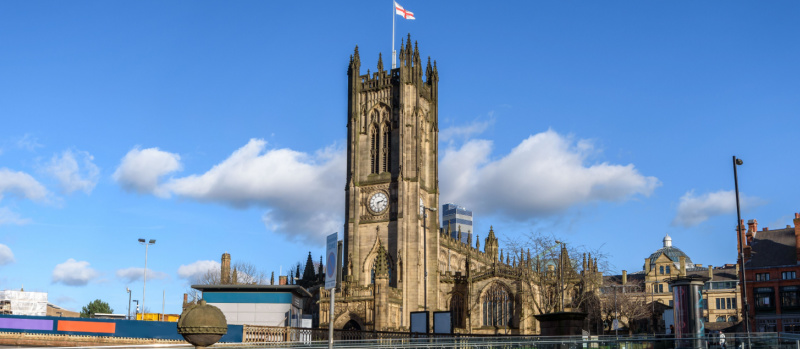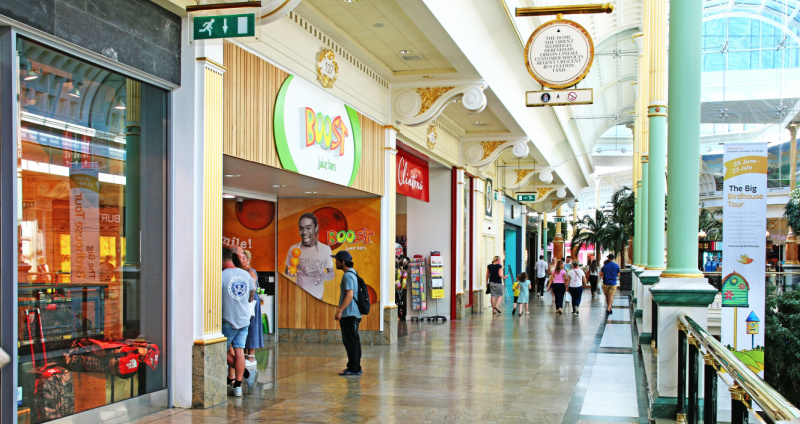This is Manchester, and as Tony Wilson famously declared, we do things differently here.
This northern English city has had an important role to play in the history of the modern world, and today continues to be a major mover and shaker on the international scene.
Established by the Romans in 79 AD as the fort Mamucium – meaning ‘Breast-Shaped Hill’ after its very hilly terrain – the city later went on to become the beating heart of the 19th Century Industrial Revolution. Some groundbreaking inventions and discoveries came out of Manchester, including one of the world’s first computers, and the very first passenger train!
The city was revitalised after the 1996 IRA bombing, and since then has become a powerhouse of business investment and creativity. Manchester’s fascinating history and spirit are reflected in the mish-mash of gothic and modern architecture, but more than anything in the openness, inquisitiveness, and sometimes irreverent attitude of its inhabitants.
We’d say all of that makes Manchester a pretty exciting place to visit. So without further ado, here’s our Manchester travel guide.
Culture
With such a rich history and being a city diverse in culture, it’s no surprise that Manchester is packed with museums, art galleries, cultural landmarks, and has an ample year-round cultural calendar.
When you visit Manchester, you’ll be able to take your pick from:
The Manchester Museum – exhibitions containing artefacts from all over the world.
John Rylands Library – beautiful, Hogwarts-esque gothic architecture envelops some fascinating collections, including an ancient fragment of St John’s Gospel.
The Museum of Science and Industry – paying homage to Manchester’s industrial past.
Manchester Art Gallery – one of the UK’s finest art collections can be found here, and more treasures are housed at Whitworth Art Gallery, close to the universities.
National Football Museum – Manchester is the UK’s football capital, and it’s only right that there should be a temple to the Beautiful Game here!
People’s History Museum – learn about Manchester’s intriguing history of standing up for workers’ rights, and the radical Labour Movement and working conditions of ordinary Mancunians throughout the centuries. Also worth a visit is the Pankhurst Centre, which celebrates the legendary sisters’ struggle for women’s rights.
Head to the neighbouring city of Salford, and you can enjoy visits to The Lowry and the Imperial War Museum North, located in the creative hub of MediaCity at Salford Quays.
Bonus tip: look out for the bee symbol peppered throughout the city in street art, on official monuments, lamp posts, and bins. The worker bee is the city’s symbol, representing Manchester’s history of industry and the hard work ethic of the people.
Aside from the art galleries and museums, there are some Manchester landmarks well worthy of a visit.
Our Manchester travel guide wouldn’t be complete if we didn’t mention Manchester Cathedral, an 8th century gem, set right in the heart of the city.
Heavily reconstructed after World War II, the building still manages to maintain some of its medieval splendour, with its gothic architecture and ancient woodwork all bathed in the heavenly light which streams through majestic stained glass windows
Make sure you seek out the Angel Stone, a carving of an angel with a scroll that was uncovered in the wall of the cathedral, believed to date back to the 8th century.

Manchester Town Hall, located in Albert Square, is another impressive edifice in the city centre.
This neo-gothic Victorian building stands out principally for its Big Ben-lookalike clock tower, standing proudly at 285 feet.
The surrounding square is one of the best spots for people-watching in Manchester, and has a real European charm about it. In the centre of the square that bears his name is an authoritative statue of Prince Albert, Queen Victoria’s beloved Consort, in what is known as the Albert Memorial.
Albert stands witness over many summer festivals and events in the square, and is engulfed in a sea of wooden huts in the famous Manchester Christmas Markets.
At the present time, the town hall is undergoing restoration work until 2024, so it’s not possible to enter, but it should definitely be on your to-visit-in-the-future list.
Next up on our Manchester travel guide is Castlefield.
This is where it all began – the Romans set up their fort in this area, and there are even still remains of the original fort in existence today.
Nowadays, the Castlefield neighbourhood is filled with canals and green spaces, but the emphasis is always on preserving its historical legacy, which is why it was designated as the UK’s first urban heritage park.
The Bridgewater Canal and the connected network of quaint waterways are dotted with bars and restaurants, and the Deansgate Locks area is home to some bustling nightlife.
Take a sightseeing tour!
One of the best ways to discover all that Manchester has to offer is by taking a sightseeing tour.
There are plenty of them about, but not every tour offers the same sights! There’s a hop-on hop-off bus tour which shows you all the essentials while you kick back and relax.
Alternatively, stretch your legs and get exploring on one of Manchester’s free daily guided walking tours (might need a brolly for that one!)
If you’re into street art, Skyliner can show and explain to you the cool creations that have sprung up in the trendy Northern Quarter.
If you prefer life on the water, book a place on the Manchester Ship Canal Cruise, taking in spectacular scenery and learning about how the ship canal shaped the city of Manchester, and the world!
Shopping
The city centre of Manchester is a shopper’s paradise! There are so many shopping options we couldn’t possibly fit them all into this Manchester travel guide, but here are some basics to get you started.
Market Street – this is the high street in Manchester, and where you’ll find all of the main retail outlets. Between Piccadilly Gardens and Deansgate, there are always plenty of people about, as well as street performers and street food vendors. This is an amazing place to people-watch and soak up Manchester’s vibrancy! Market Street runs alongside the Arndale Centre – a shopping centre rammed with all sorts of retail outlets.
For something a little more upmarket, head to the designer boutiques and department stores of King Street, Exchange Square and New Cathedral Street. Think Selfridges and Harvey Nichols.

Independent vintage shops and record stores are the order of the day in the cool, creative Northern Quarter – and there are lots of indie cafes and eateries to put your feet up in after an afternoon of browsing for bargains!
A little further afield of the centre there are more shopping havens, including the Trafford Centre, one of the largest shopping malls in Europe, and Quayside Shopping Centre, just a short tram journey away to Salford Quays.
Music Scene
Apart from football, if there’s one thing Manchester is super famous for, it’s the incredibly rich music scene it has cultivated over the years!
A long list of music legends has emerged from Manchester, including (to name but a few), Oasis, The Smiths, The Bee Gees, Joy Division, and the Happy Mondays.
While classic nightclubs like the Hacienda have long since closed down, there’s still a thriving nightlife scene, and some of the best nights out you can have here are at independent small music venues.
If you like discovering the next big thing before they’re famous it’s worth checking out the Deaf Institute, Band on the Wall, Night and Day Cafe, New Century, and landmark Jazz club, Matt and Phred’s.
The foodies among you are in for a treat, as Manchester boasts a rich and diverse population, which has in turn impacted positively on the culinary dishes on offer here!
Manchester has one of the largest Chinatowns in the UK, with an impressive range of restaurants, and if you like a bit of spice then the famous Curry Mile in Rusholme will be your second home.
Throughout the city, there are food festivals with street vendors popping up with mouth-watering flavours for every palette.
The newly opened Mackie Mayor, set in an 19th century Grade II listed market building in the Northern Quarter is your go-to spot for breakfast, brunch, lunch and dinner – check out the impressive glass roof!
Mackie Mayor isn’t the only eaterie in the Northern Quarter – there are lots to choose from. Yard and Coop serves up flavoursome fried chicken, The Bay Horse is the one for traditional hearty pub grub, and Federal’s where you’ll grab a caffeine fix!
At the weekends, GRUB is where you can satisfy your cravings for street food, craft ales, wines and spirits, while bopping along to resident DJs.
Nightlife
When the sun goes down in Manchester, life goes on. Manchester has a thriving nightlife scene, with a variety of bars, clubs, and ambiences spread throughout different areas of the city.
Fans of local ales in a cosy venue with live music should head to The Oast House. In the summer, you can sit outside in their terrace area and soak up the chilled vibes.
For something a little glitzier, check out Alberts Schloss, with its rose-gold Prosecco bar and ‘push for Prosecco’ buttons on every table. There’s a photo booth with props, and you can dance on the tables when the ‘kabaret’ live music kicks in!
Deansgate Locks is home to swanky clubs and sports bars set within the railway arches, and nearby Oxford Road has an edgier feel, in cool venues like The Deaf Institute and Gorilla, where you can catch live music from up-and-coming artists in an intimate setting.
For secret underground parties, hip industrial venues, and a decidedly cool vibe, there are lots of nooks and crannies in the Northern Quarter – head to The Castle for live music in a creaky 18th century pub, that’s still heaving with life!
Cocktail aficionados will love The Alchemist in fancy Spinningfields, and grab your friends for a cheeky game of Botanist Bingo in The Botanist, close to Manchester Art Gallery!
Last but certainly not least, to truly let your hair down, a visit to the Gay Village on the world-famous Canal Street is a must! Think cheesy music, light-up dancefloors, cheap drinks offers, drag queens and lots of glitzy FUN – leave your ego at home.
Sports
In case you weren’t already aware, Manchester is internationally renowned for being a sports mecca, particularly when it comes to football.
There are two main Premier League football teams here, Manchester United and Manchester City, each of which has its own huge stadium.
Old Trafford is home to Man Utd, while the Etihad Stadium in east Manchester is the HQ for Man City. If you have time, it’s worth catching a game, if only to experience the electric atmosphere and witness the legends doing what they do best!
Or if you don’t fancy big crowds, book yourself onto a stadium tour, to see how things work behind the scenes, and sit in the manager’s pitch-side chair!
Green Spaces
No Manchester travel guide would be complete without a nod to some of the fantastic green spaces that the city has to offer. Although Manchester is very much an urban space, much attention and care is paid to maintaining public parks for residents to enjoy.
By far the biggest is Heaton Park in north Manchester. You can still see the manor house where the aristocratic Egerton family once lived, located in the heart of a vast open space full of things to see and do. Heaton Parkpark has a reservoir, orangery, golf course, old-school tramway, and boating lake. In the summer, the park hosts music and cultural festivals – definitely worth the short tram ride to get there!
Whitworth Park, closer to the universities, is another wide open space that hosts cultural events throughout the year, and is where you’ll find the Whitworth Art Gallery.
Angel Meadow, now set in among modern, new build apartments close to the Northern Quarter, Shudehill, Red Bank, and Ancoats, is a great place to escape from the hustle and bustle of city life and take a breather. Despite its somewhat murky past, thanks to regeneration projects, Angel Meadow is now a truer reflection of its pleasant name and a delight to spend time in!
Travel
Getting around Manchester is easier than ever, as it has an integrated travel network of buses, trams, and trains.
The main train stations are Piccadilly, Victoria, and Oxford Road stations.
Chorlton Street Bus Station provides cross-country and international bus services, while Shudehill and Picadilly bus stations provide inner-city services.
There’s a free bus service called the Metroshuttle which loops around the city centre on three different routes, although it’s easy to get around most places in the city centre on foot. Most major attractions are well within walking distance from each other, and there are bikes for hire at bike stations dotted throughout the metropolis.
For travel further afield, Manchester International Airport is the global gateway to the north of England, with over 60 airlines connecting Manchester to over 200 international destinations. Though with so many attractions on offer, you’re more likely to want to stay in Manchester!
If your travels to Manchester tempts you to consider living here, you’re not alone! More and more people are choosing Manchester as their dream home destination – and opting for stylish, modern living in our New Cross Central apartments.
Get in touch today to find out more about living in Manchester!





